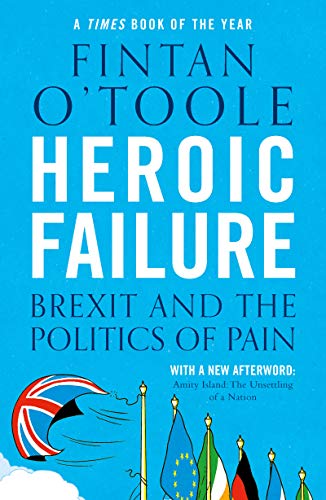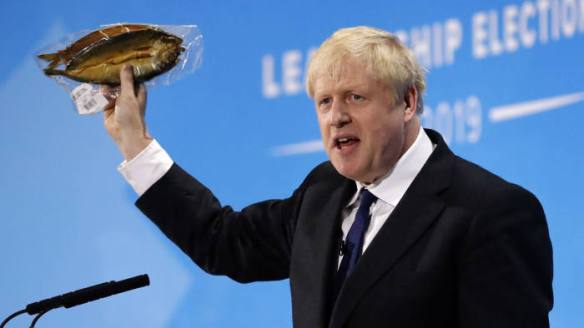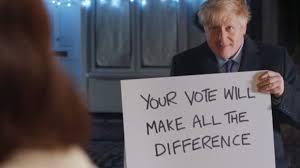If an apocalyptic flavour accompanies the end of 2019 for people born and brought up in the UK, I think we can be forgiven. The country has just suffered the second of two extraordinary self-imposed blows.
The first, in 2016, was the country’s Brexit referendum in which the population narrowly decided to leave the world’s most powerful trading block to ‘go it alone’. The second was the thumping victory for the Conservative party which unequivocally supports the referendum decision. This is against a mountain of evidence that the consequences of leaving the EU will be almost entirely negative for the majority of UK citizens.
News media outlets in the UK — most of which are Conservative-supporting — have been concentrating on the ‘how’ of the issue. How exactly will the United Kingdom leave? Hard Brexit without a deal, or “soft Brexit” with a deal? How will Brexit affect Northern Ireland which is technically part of the United Kingdom but which, since the Good Friday Agreement, shares some education, water, and health care services with Ireland (which is and will remain an EU country)? How can the UK justify leaving the EU while keeping Scotland, which overwhelmingly voted ‘remain’ and whose independence party, the SNP, has won the vast majority of Scotland’s seats in parliament?
But the “how” question is not even the most compelling one.
The real issue is”Why?” Why did the British government create a problem with the EU that didn’t exist before the far-right UK Independence Party (UKIP) began its lobbying efforts in the early 1990s? Why did the people of Britain go along with the anti-European stance not once with the 2016 referendum, but twice by voting in 2019 for the Conservatives and therefore eliminating any chance of sober second thought?
There must be some extraordinary psychological need, one so extraordinary that it ignores facts, figures, and logic, and even revels in doing so.
The famous, “We Send the EU £350 million a week” slogan on the side of Boris Johnson’s pro-Brexit tour bus in 2016 was an outright lie, of course. But, more importantly, it was proven to be an outright lie before people cast their vote in 2016. More staggering still, in the 2019 election, a non-partisan government watchdog found that 88 % of the statements made by the Conservatives were misleading or simply untrue. Again, this statistic had become common knowledge before people went to the ballot box. It still didn’t change anyone’s vote. And the usual caveat that all politicians lie doesn’t apply because the nearest rival, the Labour Party, told no verifiable lies using the same measures.
Irish writer Finton O ‘Toole’s Heroic Failure: Brexit and the Politics of Pain goes further in explaining this ‘why” question than would have seemed possible. O’Toole is a modern day Friedrich Nietzsche on this subject, discomforting readers with ideas we’d rather not face.
Using a broad historical brush, O’Toole takes us from the 2016 discovery of the wreckage of the doomed 1848 Franklin Expedition, to Captain Robert Falcon Scott and his disastrous attempt to be the first to reach the South Pole, to the last stand against the Zulus in Islandlwana, to the “heroic” catastrophe of the Charge of the Light Brigade. All of these events were about disaster. They all involved unnecessary suffering and loss of life. Yet all have been enthusiastically celebrated in adventure books, film, and poetry.

In the chapter, The Pleasures of Self Pity, O Toole examines the relationship between nationalistic self-pity and exaggerated self-regard — two sides of the same coin and essential ingredients of the British psyche, especially since the country began to decline as a colonial power. The British suffer and die — by choice– and this makes them deserving. Colonization went hand in hand with virtue and self-sacrifice. Most penetrating of all is the way O’Toole identifies the neat inversion of reality achieved through this celebration of national disaster:
“…heroic failure was an even more powerful mechanism for assuaging guilt; it re imagined the British conquest of the earth as an epic of suffering, not for the victims, but for the victors. It took the pain of the oppressed and ascribed it to the oppressors.”
There was shock and indignation when former colonies fail to display the expected gratitude to the UK in its decline. When the people of former colonies immigrate to Britain after World War II, this sense of indignation was further inflamed. Immigration was seen by some rabble-rousing politicians, most notably Conservative MP Enoch Powell, as an invasion, a reversal of the natural order of things.
Most pertinent to twenty first century politics was the seamless way this indignation transferred itself to Britain’s relationship to the EU. Brussels, host city of many EU institutions, was seen as the centre of a colonizing power. Euro-skeptics conveniently forgot that the UK had as much input into EU laws as any other country, and that, given Britain’s size and status, Brussels is (or was) as much “us” as it is anyone else.
But as anyone who listens to James O’Brien on LBC radio knows, poetic loyalty to the idea that Britain is unjustly overrun by foreigners cannot be overturned by logic. O’Brien’s technique with irate callers complaining about the tyranny of the EU is simple. He asks them which EU rules interfere with their lives.
There is usually a pregnant silence on the other end of the line.
As O’Toole reminds us, Boris Johnson has his own method for whipping up anti-EU hysteria. He lies. Among his famous assertions was the charge that the EU had banned prawn cocktail flavoured crisps (British word for chips). The small grain of truth behind this complaint was the fact that all food was subject to health regulations which limited harmful additives.

Another fictional outrage: the EU threatens the ‘great British kipper’.
O’Toole expresses a grim kind of humour as he negotiates through the faux outrage of the Brexit camp, including the false claim the EU was limiting the amount of bend permissible on bananas sold in British stores.
The Brexit campaign might read like a particularly over-the-top satire, except that it really happened and was ultimately successful in its mendacious goals.

Boris Johnson’s 2019 campaign: creepy, dishonest, but successful.
But being exasperated with Brexiteers is a waste of energy. Trying to understand the insanity, on the other hand, is almost a kind of balm, even though it won’t make the consequences any less damaging. O’ Toole’s book helps in this regard and, in its rigor and insight, often brings to mind the cold excavations of Nietzsche.
The parallels between O’Toole’s and Nietzsche’s way of thinking are sometimes striking. Every belief, however fervently held, has some deeply-rooted psychological cause.
Christians can recognize in Nietzsche’s On the Genealogy of Morality some uncomfortable truths about the psychological (rather than religious) functions of the biblical narrative. Here we are told about an all-loving God whose supreme sacrifice (of his son) puts humanity into a moral debt so enormous we can never hope to repay it. According to Nietzsche, the emotional torture caused by this debt compensates for the fact that, since the emergence of civil society with laws and regulations, humanity can no longer commit unspeakable cruelties against each other. If we can’t torture others, we have no choice but to turn our innate cruelty inwards and torture ourselves with the knowledge of our permanent indebtedness. .
Is Brexit, on some smaller scale, a way of internalizing the cruelty the Empire once visited upon others? The deliberate nature of it, the sense of stepping into misfortune with eyes wide open, suggests it might be.
O’Toole provides eye-opening twists and turns in the psychology of the Brexiteer by distinguishing British nationalism from English nationalism. It is an argument that at first takes a little swallowing, but in the end makes perfect sense. After all, there is a very clear divide between opinion in England and opinion in Scotland. In the referendum England was largely hostile to the EU; Scotland was overwhelmingly in favour.
A shift in England’s cultural identity occurred when James VI of Scotland became also James I of England in 1604. The first step towards unification of the two nations means that the ‘glory’ years of colonial expansion came under the banner of Britain rather than England. O’Toole demonstrates how Shakespeare and his company, renamed the King’s Players, suddenly became the purveyors of British, rather than English, history and drama. The disappearance of English culture into British culture would stoke trouble for the future.
While the last decades of the twentieth century saw the exercising of Scottish and Welsh identity through devolution and the eventual creation of separate Scottish and Welsh parliaments, no parallel movement occurred for England. But it was there, bubbling under the surface. O’Toole notes that Diana, Princess of Wales’ death, was a traumatic forerunner of Brexit, correlated to the spontaneous, and perhaps unexpected, reappearance of St. George’s Cross, taking the place of the Union Jack.
In the chapter The Sore Tooth and the Broken Umbrella, O’Toole argues that anti-EU sentiment is a displacement of suppressed English nationalism. “The tooth is a very small part of the body . . .,” O’Toole notes, “But a person with toothache finds it hard to think about anything else.” While Brexit is “radical, invasive surgery — not dentistry,” it does, “distract from the pain, much in the way that hitting your foot with a hammer will make you forget the ache in your tooth,” akin to self-harm.
Repression and displacement, then, are key parts of the Brexit madness, and they were ruthlessly exploited by some genuinely malignant characters like Boris Johnson and Jacob Rees-Mogg. Johnson has no regard for the truth whatever, and has made innumerable racist, sexist, and Victorian anti-working class statements. None of the people who served in his cabinet so far have shown any sign of possessing a social conscience. Rees-Mogg championed Brexit for the population he claimed to represent. Meanwhile, without a whiff of irony, he defended a move from London to Dublin of the investment management firm he founded and of which he remains a partner. Through its Irish-based investment vehicle, Somerset Capital Management can have one foot in the EU and one outside, a choice unavailable to British residents who lack Rees-Mogg’s ample means. Both these Dickensian ‘characters’ are in the mold of the well-known English eccentric, renamed by O’Toole the “harmful eccentric,” who represent “as invasive species as tenacious and damaging as Japanese knotweed.”
The “broken umbrella” of the chapter’s title refers to the nation state and its safeguards, until recently, the linchpin that was the welfare state. “The problem is,” O’Toole says, “the umbrella is broken, its material tattered, its struts sticking out like bared bones.” To see beyond self-pity and the delusions it fosters, he concludes, it is necessary to first fix the umbrella.
But the 2019 Conservative re-election feels like a last chance missed. A Nietzschian overview would suggest a country absolutely intent upon self-harm.
Paul Butler, originally from the UK, lives in Canada. He is the author of The Widow’s Fire (Inanna), a Gothic-inspired revisit of Jane Austen’s final novel, Persuasion, and the forthcoming Mina’s Child (Inanna, May 2020), in which the daughter of Dracula’s ‘heroes’ (Mina and Jonathan Harker) questions her parents’ claim to have acted with courage and virtue when disposing of a foreign nobleman.
